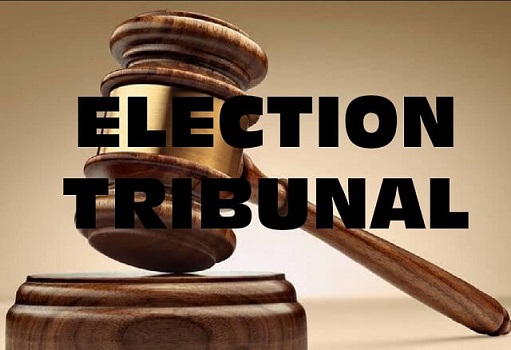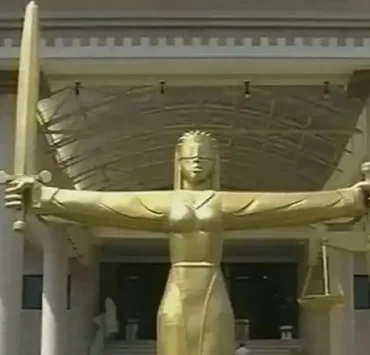Tribunal Affirms Usman Ododo as Kogi Governor

Lawyard is a legal media and services platform that provides…
The Kogi State Governorship Election Petition Tribunal has affirmed the election of Usman Ododo as Governor of Kogi State.
The three-member tribunal led by Ado Birnin-Kudu, affirmed Ododo’s governorship shortly after it dismissed the petition filed by Murtala Ajaka and the Social Democratic Party (SDP).
The tribunal, in dismissing Ajaka’s petition, held that he and his party failed to substantiate their allegations against the November 11, 2023 governorship election in Kogi State.
In the unanimous judgment, the panel held that contrary to the claims by the petitioners, the election “was conducted in substantial compliance with the Electoral Act”.
The panel subsequently dismissed the suit for being incompetent and lacking in merit.
The Independent National Electoral Commission (INEC) had declared Ododo, the candidate of the All Progressives Congress (APC), as the winner of the November 11, 2023 governorship poll.
According to the electoral umpire, the APC’s candidate had scored 446,237 votes to defeat Ajaka, who came second with 259,052 votes, and Dino Melaye of the Peoples Democratic Party (PDP), who scored 46,362 votes.
Dissatisfied, Ajaka and the SDP had approached the tribunal to challenge the victory of the APC and its governorship candidate.
Citing substantial non-compliance with the Electoral Act, as well as other irregularities, the petitioners had asked the tribunal to nullify the declaration of Ododo as governor.
At the last proceedings, while the SDP and Ajaka in adopting their final written address urged the panel to allow the petition and sack Ododo as governor, APC, Ododo and INEC on the other hand, urged the tribunal to reject and dismiss the petition for being frivolous and lacking in merit.
INEC’s lawyer, Chief Kanu Agabi (SAN), had submitted that the Court of Appeal had in a judgment held that if the grounds of a petition are inconsistent with one another, and are not consistent with the reliefs, it should be struck out.
Agabi added that the evidence led by the petitioners were grossly insufficient, citing a Supreme Court decision in a case of Tonye Cole against INEC.
He said the Supreme Court’s decision in that case “is to the effect that once the evidence called is grossly insufficient, there is no evidence”.
“In that case, the petitioner filed 305 witness depositions, but only adopted 40 of them. The petitioner only adopted about 13.1 per cent of the witness depositions.
“In this case, (the petition by the SDP and Ajaka) the depositions adopted represent just about 3.6 per cent of their witness depositions,” Agabi said.
He noted that the petitioners only called 25 witnesses, adding that in mathematical calculation of evidence, 3.6 per cent of Ajaka’s witness deposition adopted in the petition amounted to a failure and therefore, ought to be dismissed.
Agabi argued that the petitioners’ witness, who testified about the Bimodal Voter Accreditation System (BVAS) machines clearly stated that he could not guarantee whether those were the BVAS used.
He said the witness was not the maker of the inputs in the BVAS machines, adding that the evidence contained in the BVAS machines fell short of what was required under the law.
Agabi argued that out of the 25 witnesses called by the petitioners, there was no single polling unit agent among them.
“In other words, not a single person who observed the election was called. Besides, the star witness could not distinguish between what he heard and what he saw when questions were put to him,” Agabi said.
Ododo’s lawyer, Joseph Daudu (SAN), argued in similar manner and faulted the competence of the petition, which he said was statute barred having allegedly been filed out of time.
Daudu urged the tribunal to dismiss the allegation of forgery made by the petitioners against his client.
He argued that such an issue bordered on pre-election matter, which could not be raised at the state of post-election litigation.
Daudu also argued that Section 137 of the Electoral Act cited by the petitioners on allegations of over-voting was inapplicable.
APC’s lawyer, Emmanuel Ukala (SAN), equally urged the tribunal to dismiss the petition for lacking in merit.
The petitioners’ lawyer, Pius Akubo (SAN), faulted the claim by the respondents that the petition was filed out of time.
Akubo argued that the respondents themselves confirmed that the petition was filed on December 2, 2023, even by their own witness.
“I urge your lordship to hold that we filed this petition within time under our law,” he said.
He argued that the petitioners have led sufficient evidence to support their case that the election was marred by irregularities and corrupt practices.
Akubo prayed the tribunal to allow the petition and reverse Ododo’s victory.
After listening to all parties, the tribunal subsequently adjourned to a date that would be communicated to parties in the petition.
However, the tribunal last week informed counsel to parties that judgment had been fixed for Monday, May 27.
Lawyard is a legal media and services platform that provides enlightenment and access to legal services to members of the public (individuals and businesses) while also availing lawyers of needed information on new trends and resources in various areas of practice.













